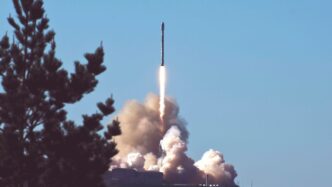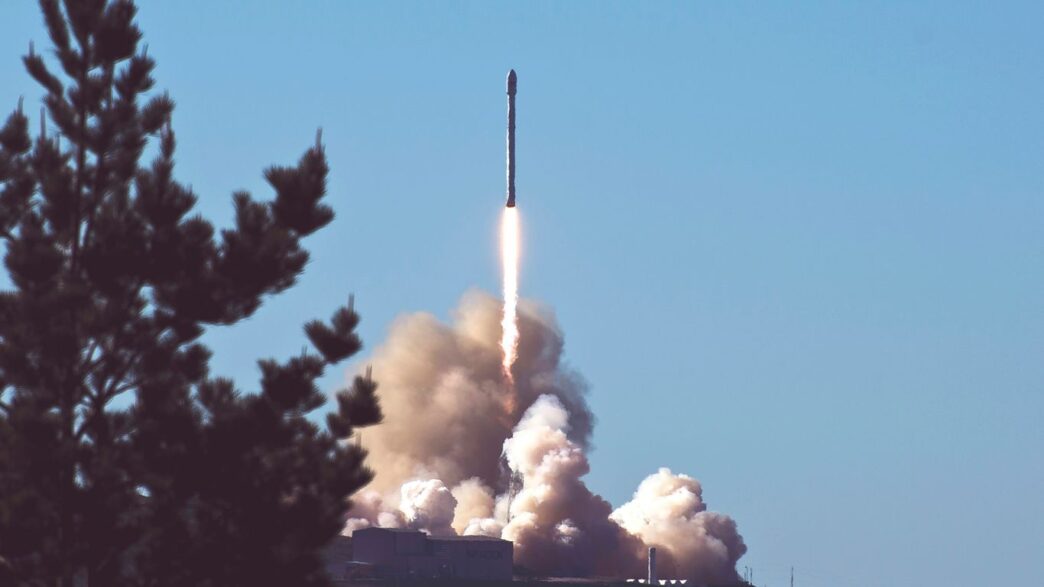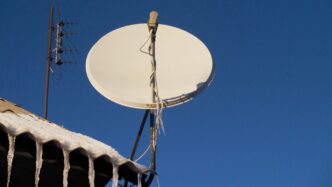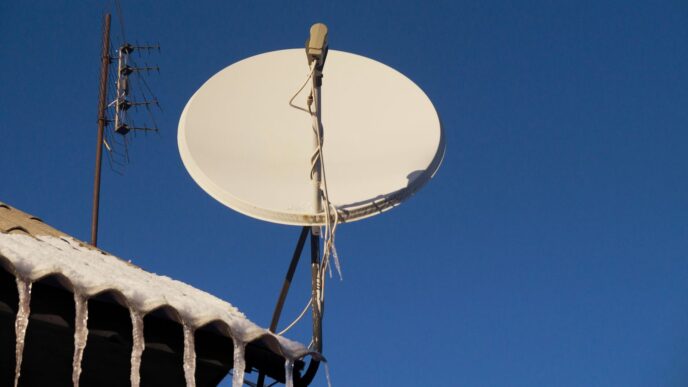So, the FAA is proposing some pretty big fines for SpaceX. We’re talking over $600,000 here. Apparently, it’s all about not following the rules during a couple of rocket launches last year. The FAA says SpaceX didn’t stick to the requirements laid out in their launch licenses. It’s a serious situation, and it looks like there’s a lot of back-and-forth happening.
Key Takeaways
- The FAA is proposing fines totaling $633,009 against SpaceX for alleged violations of license requirements during two 2023 launches.
- Specific incidents include using an unapproved launch control room and failing to conduct a required readiness poll for the PSN SATRIA mission.
- SpaceX is also cited for using an unapproved rocket propellant farm during the EchoStar mission.
- SpaceX has 30 days to respond to the FAA’s enforcement letters and has indicated it will challenge the agency’s actions, calling them regulatory overreach.
- This situation highlights ongoing discussions about safety, compliance, and the need for updated regulations in the rapidly evolving commercial spaceflight industry.
FAA Proposes Significant Fines for SpaceX
FAA Fines SpaceX Over Launch Violations
The Federal Aviation Administration (FAA) is looking to fine SpaceX a hefty sum, over $600,000 to be exact, for allegedly not sticking to the rules during a couple of launches last year. It seems like the agency is really cracking down on companies that don’t follow their licensing requirements.
SpaceX Faces Over $600,000 in Proposed Civil Penalties
So, the total proposed penalty comes out to $633,009. This isn’t just a slap on the wrist; it’s a pretty significant amount. The FAA laid out the breakdown like this:
- June 2023 Launch (PSN SATRIA Mission): $350,000 proposed penalty. This covers two alleged violations.
- July 2023 Launch (EchoStar XXIV/Jupiter Mission): $283,009 proposed penalty.
FAA Cites Failure to Follow License Requirements
The FAA’s main point is that SpaceX didn’t get the proper approvals before making changes to their launch plans. They’re saying that for the PSN SATRIA mission in June 2023, SpaceX used a new launch control room that hadn’t been approved yet. On top of that, they allegedly skipped a required readiness poll that’s supposed to happen two hours before liftoff. Then, in July 2023, for the EchoStar mission, SpaceX apparently used a rocket propellant farm that was also not yet approved. The FAA is pretty clear: safety is their top priority, and companies need to follow the rules they set out when they get a license to launch things into space.
Specific Launch Incidents Under Scrutiny
Unapproved Launch Control Room Used for PSN SATRIA Mission
So, the FAA is saying SpaceX messed up on a couple of launches last year. For the PSN SATRIA mission back in June 2023, they apparently used a new launch control room that hadn’t been given the green light by the FAA. On top of that, they allegedly skipped a required readiness poll that’s supposed to happen two hours before liftoff. The FAA is proposing a hefty fine for these two issues, totaling $350,000.
Failure to Conduct Required Readiness Poll
This ties into the previous point, but it’s worth highlighting. The FAA’s rules require a specific readiness poll to be conducted a couple of hours before a launch. It’s basically a final check to make sure everything is good to go. The agency claims SpaceX didn’t do this for the PSN SATRIA mission, which is a pretty big deal when you’re talking about sending rockets into space. They see this as a serious lapse in following the established procedures.
Use of Unapproved Rocket Propellant Farm for EchoStar Mission
Then, just about a month later, in July 2023, there was another launch, this time for the EchoStar XXIV/Jupiter satellite. The FAA says SpaceX used a rocket propellant farm that also hadn’t been approved. They had apparently submitted a request to change their explosive site plan to include this new farm, but it wasn’t finalized before they used it for the launch. This incident alone comes with a proposed penalty of $283,009. The FAA is pretty clear that safety is their top priority, and using unapproved facilities or skipping checks just isn’t going to fly.
FAA’s Stance on Safety and Compliance
Safety Drives FAA’s Oversight Responsibilities
The Federal Aviation Administration (FAA) makes it clear that safety is the absolute top priority when it comes to overseeing commercial space launches. They see their role as having a legal duty to make sure companies holding licenses for space transportation are operating safely. It’s not just a suggestion; it’s a core part of their job.
Consequences for Non-Compliance with Safety Requirements
When companies don’t stick to the safety rules, there are definitely going to be repercussions. The FAA isn’t playing around with this. They’ve laid out specific instances where they believe SpaceX fell short, leading to proposed fines. These aren’t just minor paperwork issues; they’re tied to the actual process of launching rockets.
Here’s a breakdown of the proposed penalties:
- June 2023 Launch (PSN SATRIA Mission):
- Used an unapproved launch control room.
- Failed to conduct the required readiness poll two hours before launch.
- Proposed Penalty: $175,000 per violation, totaling $350,000.
- July 2023 Launch (EchoStar Mission):
- Used an unapproved rocket propellant farm.
- Proposed Penalty: $283,009.
Legal Responsibility for Commercial Space Transportation Licenses
Getting a license to launch rockets isn’t like getting a driver’s license. It comes with serious legal obligations. The FAA emphasizes that holding such a license means a company is legally responsible for adhering to all the safety protocols and requirements set forth. This isn’t just about avoiding accidents; it’s about maintaining the integrity and safety of the entire commercial space sector.
SpaceX’s Response to FAA Allegations
So, the FAA’s come out with some pretty hefty proposed fines for SpaceX, and naturally, the company isn’t just rolling over. They’ve pushed back pretty hard against these claims, and it sounds like they’re gearing up for a fight. It’s not exactly a surprise, given how SpaceX operates – they’re all about pushing boundaries, and sometimes that means butting heads with regulators.
SpaceX Vows to Challenge FAA’s Regulatory Overreach
SpaceX has made it pretty clear they think the FAA is overstepping its bounds here. In a letter sent to Congress, the company stated they "forcefully reject the FAA’s assertion that it violated any regulations." They’re calling the FAA’s actions "highly irregular, and perhaps unprecedented," especially with the FAA’s Chief Counsel being quoted on an enforcement matter. It seems SpaceX believes the FAA isn’t keeping up with the pace of innovation in the commercial space sector. They’ve even said they plan to file a lawsuit against the FAA over what they see as regulatory overreach. It’s a bold move, for sure.
Claims of Politically Motivated Action by FAA
Adding another layer to this, Elon Musk himself has suggested that the FAA’s timing and actions might be politically motivated. He hinted at this on social media, implying that the agency’s move could be influenced by factors beyond just safety compliance. While the FAA hasn’t directly responded to these specific claims, it certainly adds a dramatic element to the ongoing dispute. It makes you wonder what’s really going on behind the scenes.
SpaceX Rejects FAA’s Assertions of Violations
SpaceX isn’t just saying they disagree; they’re actively refuting the specific violations the FAA has pointed to. They argue that the FAA’s Office of Commercial Space Transportation (AST) has been slow to review licensing materials and hasn’t modernized its regulations effectively. Regarding the specific incidents:
- Launch Control Room & Readiness Poll: For the PSN SATRIA mission, SpaceX claims the FAA’s allegations about the launch control room and readiness poll are unfounded. They believe they followed all necessary procedures.
- Propellant Farm: Concerning the EchoStar mission, SpaceX disputes the claim that an unapproved propellant farm was used. They state that they provided the FAA with all required analysis for the revised location, which they believe was twice the distance from the nearest public area compared to previous setups.
SpaceX is committed to safety, but they also feel the FAA’s approach is hindering progress. They’re pointing out that they have to secure significant liability insurance, like the $500 million in liability insurance mandated by the FAA, which shows their commitment to covering potential risks.
Timeline for Response and Previous Violations
So, SpaceX is in a bit of a bind with the FAA right now. They’ve got a deadline looming to respond to these proposed fines, and it’s not the first time they’ve had to deal with the agency over safety stuff. Basically, the FAA is saying SpaceX didn’t stick to the rules on a couple of launches last year, and now they’re looking at a hefty penalty.
SpaceX Has 30 Days to Respond to Enforcement Letters
When the FAA sends out these kinds of letters, it’s not just a suggestion. SpaceX has a specific window to get their side of the story in. They have exactly 30 days from when they receive the official enforcement letters to get their response filed with the FAA. This isn’t a casual chat; it’s a formal process. Missing this deadline could mean they just accept the penalties, which nobody wants.
Previous FAA Fine for Undisclosed Safety Data
This isn’t exactly uncharted territory for SpaceX. Back in the day, they actually got fined by the FAA before. This earlier penalty was for not sharing some important safety information. It seems like the FAA is really focused on making sure companies are upfront about any potential risks, especially when you’re dealing with rockets. It’s a big deal, and apparently, SpaceX had to pay up for not disclosing what they should have.
Corrective Measures Required After Starship Test Launch
Remember that big Starship test launch? Yeah, that one also had some follow-up actions required by the FAA. After the test flight, the FAA looked at what happened and decided some changes were needed. This wasn’t a fine, but more like a directive to implement specific corrective measures. It shows that even test flights aren’t just free-for-alls; there’s oversight, and lessons learned often come with homework assignments from the regulators.
Broader Implications for Commercial Spaceflight
Need for Modernized FAA Regulations
Look, the whole situation with SpaceX and the FAA really makes you think about how we regulate things in the space industry. It feels like the rules were written for a different era, you know? When only governments were launching rockets. Now, we’ve got private companies doing all sorts of amazing things, pushing boundaries faster than anyone expected. The FAA’s job is to keep things safe, and that’s super important, no doubt. But if the regulations themselves are holding back progress, maybe it’s time for an update. It’s like trying to use a flip phone to navigate today’s internet – it just doesn’t quite cut it anymore. We need rules that make sense for the speed and scale of modern spaceflight.
Balancing Innovation with Safety Oversight
This is the tricky part, isn’t it? How do you let companies like SpaceX innovate and do their thing without cutting corners on safety? It’s a tough balancing act. The FAA has to be the watchdog, making sure everything is done right. But if they’re too strict, or if their processes are too slow, they could stifle the very innovation that makes America a leader in space. Think about it: if every little change requires a massive amount of paperwork and waiting, companies might just stick to the old ways. We need a system that encourages new ideas while still having solid safety checks in place. It’s about finding that sweet spot where progress and safety go hand-in-hand.
Ensuring America Leads Future Space Exploration
Ultimately, this is about more than just one company or one agency. It’s about where America stands in the future of space. We’ve always been pioneers, right? From the moon landing to the satellites that connect us all. If we want to keep that edge, we need to support our private space companies. That means having smart regulations that allow for rapid development but don’t compromise on safety. It’s a big deal for national security and for our economy. We can’t afford to fall behind because our regulatory framework is stuck in the past. America’s leadership in space depends on our ability to adapt and evolve.
What’s Next?
So, SpaceX has 30 days to get back to the FAA on these fines. It’s a pretty big chunk of change, over $600,000, for not following the rules on two separate launches last year. Elon Musk has already said they’re going to fight it, claiming the FAA is overstepping. This whole situation really highlights the tricky balance between pushing the limits in space exploration and making sure everything is done safely and by the book. We’ll have to wait and see how this plays out, but it’s definitely a big deal for the future of commercial spaceflight and how companies like SpaceX work with regulators.
Frequently Asked Questions
What is the FAA proposing to fine SpaceX for?
The FAA is suggesting that SpaceX pay over $633,000 because they think SpaceX didn’t follow the rules for two rocket launches in 2023. They say SpaceX used a launch control room and a fuel storage area that weren’t approved yet, and they skipped a required check before one of the launches.
What were the specific issues during the launches?
For a launch in June 2023, SpaceX apparently used a new launch control room without getting permission first and didn’t do a check-in called a ‘readiness poll’ two hours before liftoff. For a launch in July 2023, they used a rocket fuel storage area that hadn’t been approved yet.
How much money is SpaceX being fined in total?
The FAA is proposing a total of $633,009 in fines. This includes $350,000 for the issues during the June launch and $283,009 for the problems during the July launch.
How does SpaceX plan to respond to these fines?
SpaceX has 30 days to respond to the FAA’s letters. The company’s leader, Elon Musk, has said that SpaceX will fight these fines, claiming the FAA is overstepping its authority and that the action is politically motivated.
What is the FAA’s main concern in these cases?
The FAA says that safety is their top priority. They are responsible for making sure companies launching rockets follow safety rules and the terms of their licenses. They believe that not following these rules can lead to serious problems.
Are there other issues between SpaceX and the FAA?
Yes, this isn’t the first time. In the past, SpaceX has been fined for not giving the FAA all the safety information before a launch. Also, after a test launch of their Starship rocket, the FAA made SpaceX make many changes to improve safety.










